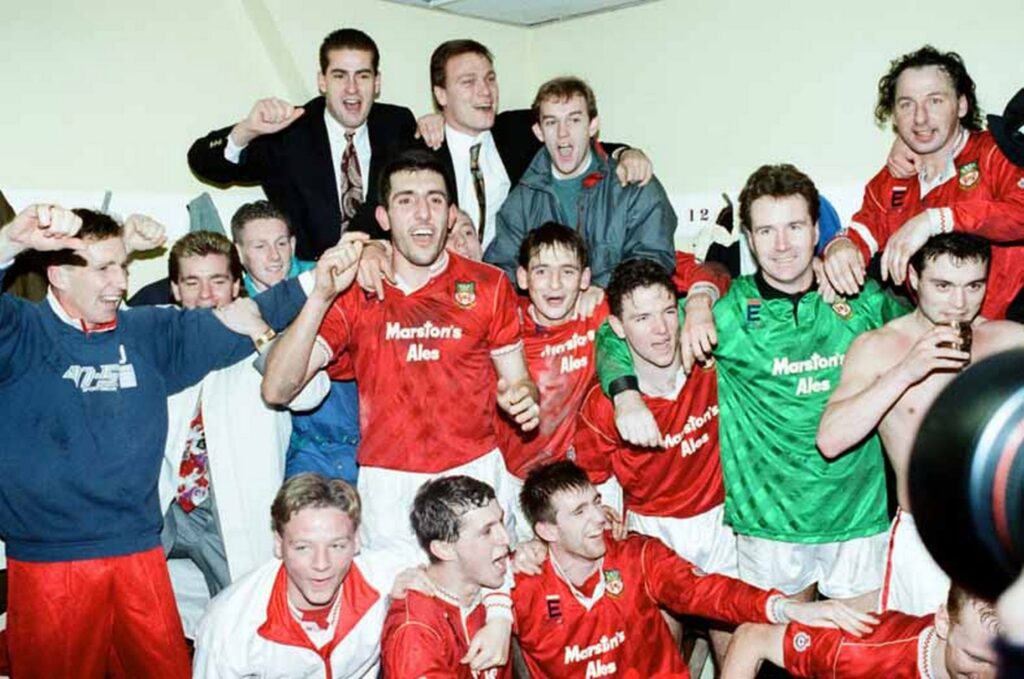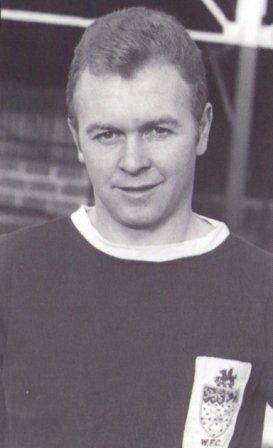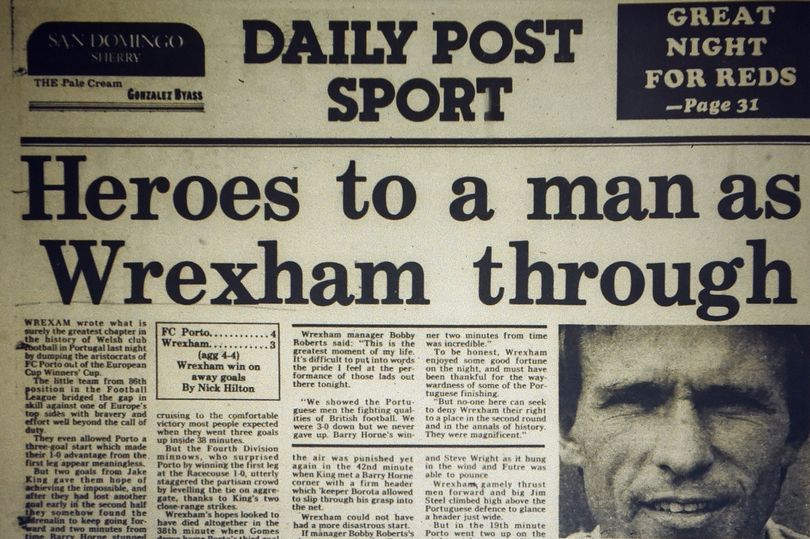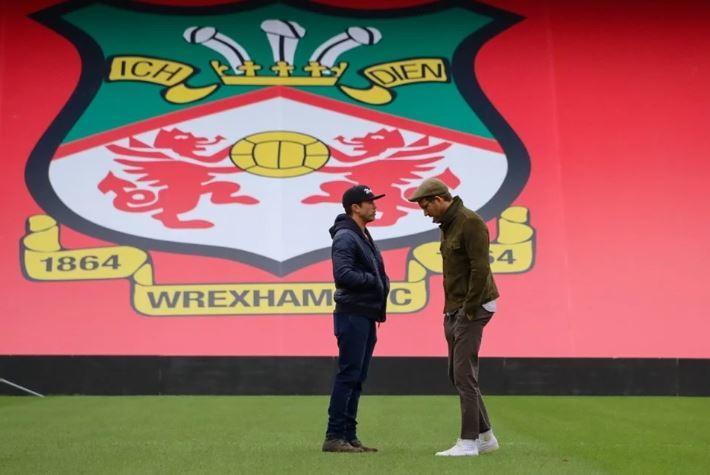Hollywood or Bust: The Wrexham Football Story
WREXHAM Association Football Club are the oldest club in Wales and the third oldest professional football team in the world. From August 2011 to November 2020, Wrexham was a supporter-owned football club, but was taken over by Canadian actor Ryan Reynolds and American actor Rob McElhenney.
What followed was a story even Hollywood script-writers would have found too far-fetched as three back-to-back promotions saw Wrexham rise from non-League football to the EFL Championship, the second tier of the English football league system, by the 2025–26 season.
The 2020 purchase of the club by McElhenney and Reynolds and the attendant publicity from the docuseries Welcome to Wrexham had a significant impact on the club’s visibility, leading to its acquiring a new global fanbase with no precedent for a team who were then in the fifth division.
Wrexham’s home stadium, the Racecourse Ground, is the world’s oldest international stadium that still continues to host international games. The record attendance at the ground was set in 1957, when the club hosted a match against Manchester United in front of 34,445 spectators.
The club initially participated in friendlies and cup competitions, and first entered a league by joining the Combination in 1890. They spent 13 seasons in the Combination and two seasons in the Welsh Senior League, winning four Combination titles and two Welsh Senior League titles. They entered the Birmingham & District League in 1905, where they would remain until becoming inaugural members of the Football League’s Third Division North in 1921.
They spent 47 years in the northern section until they were placed in the re-organised Third Division in 1958 and then relegated two years later. Wrexham were promoted out of the Fourth Division in 1961–62, only to be relegated again two years later. Another promotion followed in 1969–70 and they reached the second tier for the first time after winning the Third Division title in 1977–78.
Two successive relegations saw them back in the fourth tier by 1983 and they took until 1992–93 before seeing another promotion. Relegated once more in 2002, they gained immediate promotion in 2002–03, before worsening financial problems resulted in another relegation and then administration in December 2004.
It took 18 months for the club to exit administration and the club’s decline on the pitch continued, as they dropped out of the Football League in 2008. After that, Wrexham had unsuccessful play-off campaigns in the Conference and National League, before their footballing fairy-tale began under the guidance of their new high-profile owners.
Wrexham’s honours include winning the Welsh Cup a record 23 times, the Football League Trophy in 2005 at the Millennium Stadium and the FA Trophy in 2013 at Wembley Stadium. The club are also record winners of the short-lived FAW Premier Cup, winning it five times out of the 11 years of its tenure, participating against fellow Welsh clubs such as Cardiff City, Swansea City and Newport County.
Their biggest rivalries are with English clubs Chester and Shrewsbury Town, however, with games between the clubs known as the cross-border derby.
In 1992, Wrexham memorably upset the reigning English champions Arsenal in the FA Cup. They also scored a 1–0 victory over FC Porto in 1984 in the European Cup Winners’ Cup. Wrexham were eligible for the Cup Winners’ Cup due to winning the Welsh Cup; their first European tie was against FC Zürich of Switzerland in 1972 and their last was played in Romania against Petrolul Ploiești in 1995.

The club was formed in October 1864 by members of the Wrexham Cricket Club who wanted a sporting activity for the winter months. This makes them (after Sheffield, Cray, Hallam, Notts County, and Nottingham Forest) the sixth oldest football team, the third oldest professional club and the oldest in Wales. Their first game was played on October 22, 1864, at the Denbigh County Cricket Ground (The Racecourse) against the Prince of Wales Fire Brigade.
In 1876, the newly-formed Football Association of Wales saw Wales play their first international match, against Scotland at The West of Scotland Cricket Club, Partick, featuring Edwin Cross and Alfred Davies as the first of many Wrexham players to play for the national team.
1883 saw Wrexham’s first appearance in the FA Cup, when after receiving a bye to the second round of the competition, but were defeated 3-4 at home by Oswestry. Crowd trouble at the game led to the club being expelled from the Football Association, leading to the club being reformed in 1884 as Wrexham Olympic. The Olympic was dropped from this club’s name in 1888.
Thanks to a dispute with their landlords, who had raised the rent of the Racecourse Ground to £10 a year, Wrexham played their home games in the 1881–82 and 1882–83 seasons at Rhosddu Recreation Ground (changing the club’s name to Wrexham Athletic for one season), before moving back to the Racecourse Ground for the 1883–84 season, where the club have played their home games ever since.
During their time in the Birmingham and District League, Wrexham won the Welsh Cup six times, in 1908–09, 1909–10, 1910–11, 1913–14, 1914–15, and 1920–21. They also reached the first round proper of the FA Cup for a second time in the 1908–09 season before losing a replay 1–2 to Exeter City after extra time.
In 1921, Wrexham were elected to the newly-formed Third Division North of the Football League. Their first League game was against Hartlepool United at the Racecourse in front of 8,000 spectators. Playing in blue shirts, Wrexham were defeated 0–2. The week after this defeat, Wrexham travelled north to play Hartlepool and managed to get their revenge by beating them 1–0.
In the 1928–29 season Tommy Bamford made his first appearance for the club. He went on to score 201 league and cup goals for the club during his time at the Racecourse.
Wrexham enjoyed their best ever Third Division North season in 1932–33, when they finished runners-up to Hull City and won 18 of their 21 home games during the course of the season. This was the first season that the club appeared in their now-familiar red and white strip for the first time for the short-lived 1939–40 season.
During the Second World War years, when long cross-county trips were impossible due to the war, Wrexham played in the Regional League West against local teams from Merseyside and Manchester, amongst others in the north west region. Wrexham’s position as a barracks town meant that the team could secure the services of many famous guest players such as Stanley Matthews and Stan Cullis.
The club reached the fourth round of the FA Cup in 1956–57 where they played Manchester United’s Busby Babes in front of 34,445 people at a packed Racecourse. The 5–0 defeat did not spoil the occasion for the large home crowd, and later that season Wrexham managed to win the Welsh Cup for the first time in 26 years.
1960 saw the club relegated for the first time in their history as they dropped into the newly-created fourth division. But their performances did improve following the appointment of Ken Barnes as player-manager. He led Wrexham straight back to promotion to the third division in his first season in charge and oversaw the record 10–1 trouncing of Hartlepool United. Two years after their promotion, Wrexham were relegated to the fourth division again, and in 1966 they finished rock-bottom at 92nd in the Football League.
With Welsh clubs now able to qualify for the European Cup Winners’ Cup by winning the Welsh Cup, Wrexham played their inaugural match in Europe against Swiss side FC Zurich in Switzerland on September 13, 1972, the game finishing 1–1. In the return leg Wrexham won 2–1, advancing to the second round with a 3–2 win on aggregate. The second round drew Wrexham against Yugoslav side Hajduk Split. Over the course of two games the score finished 3–3 on aggregate with Wrexham matching their more illustrious opponents, but they were knocked out of the competition due to the away goals rule.
The 1972–73 season saw the completion of the new Yale stand, with the ability to hold a capacity of up to 5,500.
The 1973–74 season saw Wrexham change their badge from the Maelor crest to a brand new badge that had a lot more resemblance to the Welsh roots of the club, with three feathers on the top of the badge and two dragons. This season also saw Wrexham reach the quarter-finals of the FA Cup in another cup run.
1975–76 saw John Neal’s starlets, captained by Eddie May, again shock the football world by reaching the quarter-finals of the European Cup Winners’ Cup after another sparkling cup run and multiple defeats of higher quality opponents. Wrexham played Belgian champions Anderlecht in the quarter-finals and narrowly lost 2–1 to the eventual winners of the competition.
The 1976–77 season saw Wrexham again beat First Division opposition in cup competitions, defeating Tottenham Hotspur in the Football League Cup and Sunderland in the FA Cup.
Arfon Griffiths took over as player-manager for the 1977–78 season. Building upon their growing reputation as tenacious cup fighters, they reached both the League Cup and FA Cup quarter-finals that season, before finally clinching promotion to the second division by beating Rotherham United 7–1 at a packed Racecourse and going on to win the Division Three Championship.

In the 1978–79 season, Wrexham made it to the fourth round of the FA Cup where they narrowly lost to star-studded Tottenham Hotspur 3–2 in a replay after the first game finished 3–3. The Spurs team had world stars in their ranks such as Ossie Ardiles, Ricky Villa and Glenn Hoddle.
Following Arfon Griffiths’ resignation from the manager’s position in 1981, his assistant Mel Sutton was put in charge, with the memorable third round FA Cup win over Brian Clough’s Nottingham Forest, in another cup run, the highlight of the season.
The summer of 1982 saw Bobby Roberts appointed to the Wrexham’s hot-seat. Relegation meant the club had dire financial problems, resulting in the sale of many experienced and talented players. Frank Carrdus, Ian Edwards, Mick Vinter and Wayne Cegieski had already left during the summer; Steve Fox, Joey Jones, Dixie McNeil and Billy Ronson soon followed. Wrexham were again relegated to the fourth division after plummeting from apparent mid-table security. The club’s slide continued into the following season, and only goal difference prevented Wrexham from being forced to apply for re-election to the League.
The 1984–85 season saw Wrexham take on FC Porto in European competition. Wrexham won the home leg with a 1–0 victory, but in the second leg Porto showed their class and were 3–0 up after 38 minutes. However, Wrexham pulled goals back and the game finished 4–4 with Wrexham advancing on away goals.

The second round draw was to pair Wrexham with Italian AS Roma, managed by Sven-Göran Eriksson. Wrexham lost 3–0 on aggregate over the two legs. Their league performance was even more dire than the previous year, and by the time Bobby Roberts was finally removed from his post, Wrexham were rock-bottom of the entire Football League.
Former Racecourse favourite Dixie McNeil was appointed caretaker manager and immediately inspired a revival that saw Wrexham win seven of their last 10 matches and comfortably finish clear of having to apply for re-election, which earned him the job on a permanent basis that summer.
His first season in charge saw the team finish mid-table in an average season, and McNeil led the team to a Welsh Cup final win over Kidderminster Harriers.
Wrexham made a return to European football in 1986 with a first-round 7-0 aggregate victory against Maltese side FC Zurrieq, to earn a second round tie against Real Zaragoza which they drew 2–2 on aggregate, but went out on away goals.
Wrexham reached the fourth division play-offs in 1989, having finished seventh in the league. Wrexham beat Scunthorpe United in the semi-final 5–1 on aggregate, but narrowly lost to Leyton Orient 2–1 in the final.
When Wrexham started the next season with just three wins from 13 league games, McNeil resigned before his inevitable sacking.
He was replaced, initially on a temporary basis, by Brian Flynn, but his appointment was made permanent a month later. However, the club continued to struggle domestically, and Flynn was forced to make three important signings in Mark Setori, Eddie Youds and Alan Kennedy which saw the team finish in 21st place, therefore avoiding relegation.
For the 1990–91 season it was announced there would be no relegation to the Conference Premier as a team had already voluntarily left the league. That season Wrexham were to finish in 92nd place. They were knocked-out of the European Cup Winners’ Cup in the second round by Manchester United, 5–0 on aggregate, who eventually went on to win the trophy.
The 1991–92 season saw Wrexham still in a poor financial state, as they continued to struggle on the field. With the club knocked out of the League Cup and struggling in the league, it was left to the FA Cup to keep the season alive. Having beaten Telford United and Winsford United they were drawn to play the previous season’s First Division champions Arsenal. Wrexham produced one of their most memorable nights to beat the Gunners 2–1 after being behind, with a thunderous Mickey Thomas free kick and a Steve Watkin goal. They lost in the next round to West Ham United 1–0 in a replay after the first game had finished 2–2.
In an attempt to change the fortunes of the club after several seasons in the doldrums at the bottom of the football league pyramid, the 1992–93 season saw Flynn make a shrewd signing when he enlisted the services of Gary Bennett, who soon settled and helped Wrexham into the promotion race. Wrexham’s season came to a head on April 27, 1993, when, with two games left, they travelled to Northampton Town requiring a win to gain promotion to the next tier of English football. The game ended with a 2–0 victory to Wrexham, cheered on by 5,500 travelling ‘Reds’ supporters.
The 1994–95 season would see Wrexham achieve more success in cup competitions, this time going on a run through the FA Cup. Having beaten Stockport County and Rotherham United, they faced Premier League side Ipswich Town at the Racecourse, with Wrexham running out 2–1 winners thanks to goals from Gary Bennett and Kieron Durkan. In the next round, Wrexham were drawn away to Manchester United and despite taking the lead at Old Trafford, went on to lose 5–2.
The 1996–97 season saw Wrexham set off on another amazing run in the FA Cup and beating more top-flight opposition. Following wins at Colwyn Bay and Scunthorpe United, they were drawn to play West Ham United at home, the game ending in a 1–1 draw on a snow-covered pitch. The replay at Upton Park ended in a shock 1–0 win to Wrexham as Kevin Russell scored in the dying minutes to send the north Walians into the fourth round. After also beating Peterborough United and Birmingham City in the following rounds, they played Chesterfield in an all-Division-Two FA Cup quarter-final, Wrexham narrowly losing to the Spireites 1–0.
June 1997 was the date for the official opening of Colliers Park, which was Wrexham’s new training ground and was situated just outside Gresford on Chester Road. It was built at a cost of £750,000 and widely regarded as one of the best training grounds outside of the top flight.
The 1999–2000 season saw Wrexham again beat a top-flight team in the FA Cup, this time in the shape of Middlesbrough. The final score of the match was 2–1, with the second-half goals coming from Robin Gibson and Darren Ferguson after being behind to the Premiership outfit. Wrexham went on to win the FAW Premier Cup in May 2001.
At the start of the 21st Century the club was dogged by many problems off the pitch. In the summer of 2004, the club were given a year’s notice to quit the Racecourse.
Fans developed an affinity with supporters of fellow football league club Brighton & Hove Albion, who themselves had managed to successfully depose their chairman and keep control of their stadium after he had sold the ground for development purposes in almost the same circumstances.

On December 3, 2004, the club was placed in financial administration by the High Court in Manchester as the club owed £2,600,000, including £800,000 which was owed to the Inland Revenue in unpaid taxes. Wrexham became the first League club to suffer a 10-point deduction under the new rule for being placed in administration, dropping them from the middle of the League One table to the relegation zone and subsequently condemning them to relegation.
Despite their financial troubles, Wrexham went on to win the 2004–05 Football League Trophy by defeating Southend United 2–0 after extra time, in Wrexham’s first appearance at the Millennium Stadium in Cardiff. The winning goals were scored by Juan Ugarte and Darren Ferguson.
Wrexham still retained an outside chance of escaping the drop in the 2004–05 season following an end-of-season winning streak; however, their faint hopes of staying up were ended with a 2–1 home loss to Brentford on May 3, 2005. The 10-point deduction proved decisive in determining Wrexham’s fate.
In October 2005, Birmingham High Court decided that Alex Hamilton’s company CrucialMove had improperly acquired the freehold of the Racecourse ground and the decision went against him. Hamilton took this to the Appeal Court in London and it ruled in March 2006 that the stadium must remain in the hands of the club’s administrators. The following month, the administrators reached an agreement with local car dealer Neville Dickens to take over control of the club and all its assets.
The 2006–07 season started well for Wrexham, as they went eight games unbeaten, but eventully a long relegation battle ensued for Wrexham. Manager Denis Smith was sacked along with his assistant Kevin Russell on January 11, 2007, with Wrexham in the bottom half of the division and after a poor run of results to be replaced by coach Brian Carey.
Wrexham’s league status was saved on the last day of the season with a vital 3–1 victory on May 5, 2007, at home to Boston United which sent their opponents down to the Conference Premier.
Expectations were high for the 2007–08 season, but by the middle of November Wrexham were rooted to the bottom of the table. Brian Little was brought in as manager as replacement to Carey, who took the role of assistant manager.
After a promising start to his reign, a run of seven straight league defeats forced Little to ring the changes and he brought in 11 players in the January transfer window to attempt to change Wrexham’s fortunes. However, the club was eventually relegated following a 2–0 defeat at Hereford United, ending Wrexham’s 87-year stay in the Football League.
During the 2008–09 season Little left Wrexham by mutual consent, Dean Saunders taking over as manager. Wrexham were mid-table in their first two seasons of Conference Premier football.
In April 2011, the club were served with a winding-up order from HMRC, with an unpaid tax bill of just under £200,000. The team finished the 2010–11 season in fourth place, qualifying for a play-off spot.
During the 2011–12 season, Wrexham FC were invited back into the Welsh Cup after 16 years, entering at the third round stage. Their first game was at home to Airbus UK, but a schedule clash meant that the club were required to play two games on December 3, 2011, one against Airbus, and the other against Brentford in the second round of the FA Cup. Although the scratch side fielded against Airbus lost, the first team fielded against Brentford produced a shock 1–0 win.
New manager Andy Morrell guided Wrexham to a record tally of 98 points, but this was not enough to gain promotion.
Wrexham earned themselves places in both the FA Trophy final and the Conference Premier play-off final, their first two appearances at Wembley Stadium, within five weeks of one another. In the FA Trophy final, Wrexham won on penalties after a 1–1 draw with Grimsby Town. A 5–2 aggregate win over Kidderminster Harriers in the two-legged play-off semi-final saw Wrexham through to the final versus Newport County, the first play-off final to feature two Welsh teams; Newport defeated Wrexham 2–0.
On February 24, 2014, Morrell stepped down as manager. Billy Barr took temporary control until Kevin Wilkin was announced as the new manager. Wrexham finished the 2013–14 season in 17th place, the lowest position in the club’s 150-year history.
After several years in the doldrums, Wrexham were revitalised when, on November 16, 2020, it was confirmed that actors Reynolds and McElhenney, through the RR McReynolds Company LLC, would be taking over the club after receiving the backing of the Wrexham Supporters Trust.
Reynolds said, “This is the third-oldest club on the planet and we don’t see why it can’t have a global appeal. We want Wrexham to be a global force.”
Reynolds and McElhenney announced that they would be making a documentary series about the club and guaranteed that it would not be “relocated, renamed or rebranded”.
Despite reaching the FA Trophy final and mounting a serious challenge for promotion, Wrexham failed in their bid to return to the Football League during the new owners’ first season at the helm.
The docuseries, Welcome to Wrexham, debuted on August 24, 2022, had a significant impact on the club’s visibility, leading to its acquiring a new global fanbase, particularly in the United States. The club’s fortunes began to attract dedicated coverage from global sporting media that would not typically be afforded teams outside the Premier League.
During the 2022–23 season, the team progressed to the fourth round in the FA Cup, being the only National League team to be able to do so, beating Coventry City in an upset in the third round, and eventually being knocked out by Sheffield United in a replay.
Wrexham vied with Notts County throughout the season to lead the league, trading the first spot back and forth, and both setting new National League records for wins, goals, and goal difference,
On April 22, 2023, Wrexham, under the guidance of manager Phil Parkinson, finally secured their first league title in 45 years and were promoted to EFL League Two after a 15-year absence, following a 3–1 win against Boreham Wood.
The club amassed a tally of 111 points that season, a record for the top five divisions of English league football, beating Notts County to the championship and single automatic promotion spot.
An open-top bus tour by the team was greeted by rapturous fans and an historic pre-season tour of the United States followed, including a 3-1 victory over a Manchester United XI, before Wrexham embarked upon their fairy-tale return to league football.
During the 2023–24 season, Wrexham secured a second successive promotion, taking the club to EFL League One, the third tier of the English football system, and ultimately finished second behind Stockport County.
The 2024–25 season began with Wrexham’s first League One match in 19 years, and with the 5,000th recorded league match for the club, winning 3–2 at home to Wycombe Wanderers.
By now, the club’s worth was said to have risen to £100m. The club’s financial statements for the 2023/24 season revealed in March 2025 that the loans from Reynolds and McElhenney, grown to £15m, had been fully repaid and that the turnover of £26.7m set a record for a League Two side.
On 26 April, Wrexham won promotion to the EFL Championship after beating Charlton Athletic 3–0 at home and finishing second behind Birmingham City. They became the first club in the history of England’s top five football divisions to achieve back-to-back-to-back promotions. This led to the club’s valuation increasing to about £150m, according to football finance experts, an increase of 7,400% within four years.
